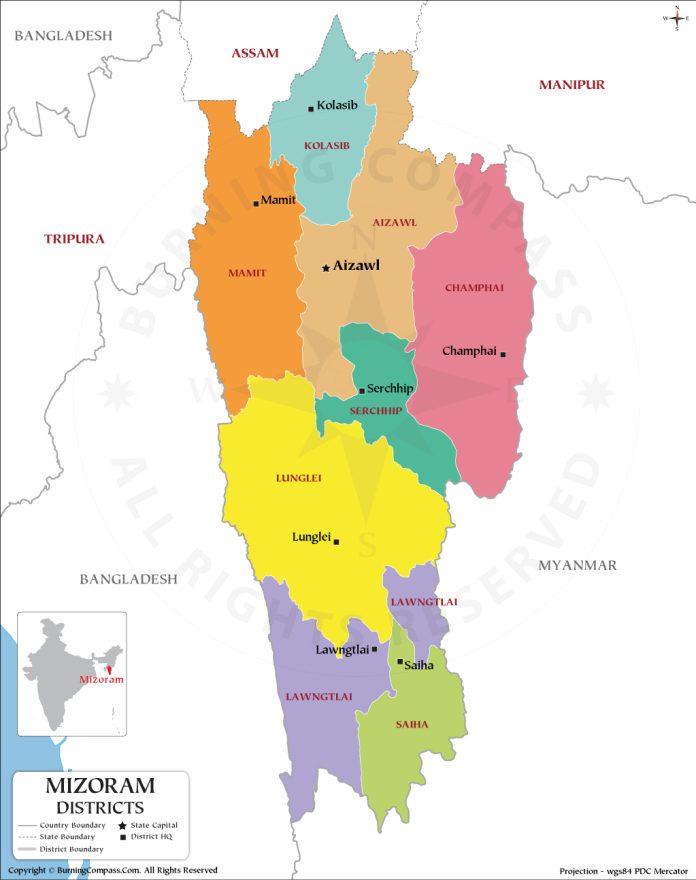– Mohammed Atherulla Shariff
October 31: Mizoram will vote on November 7 to elect the representatives for its 40-member strong state Assembly. The main political parties in Mizoram are the ruling Mizo National Front (MNF), the Congress and the Zoram People’s Movement (ZPM). The MNF, Congress and ZPM are contesting all 40 Assembly constituencies.
In the 2018 Mizoram Assembly Election, the MNF formed the government with 27 MLAs, while the Congress was reduced to only 5 seats. The BJP was successful in opening its account in the state for the first time when its candidate Buddha Dhan Chakma won the Tuichawng seat. The MNF received 37.70 percent of votes in the state. The Congress and the BJP received 29.98 percent and 8.09 percent of votes respectively in the state.
Mizoram, like many other eastern states, is a Tribal Christians dominated state. But for one, all the 40 assembly seats are of reserved category. Total electorate is around 7.5 lakh.
The Mizo Nation Front has been the torchbearer of the tribal interests. Zoramthanga, the current Chief Minister, is also MNF chief. He has been representing his people since the first assembly elections in 1987. He became an active member of the MNF during the times of the MNF uprising and also joined the guerrilla movement. Zoramthanga was appointed as one of the Cabinet ministers in the Laldenga ministry after the signing of the Mizoram Peace Accord. He was also the Mizoram Chief Minister twice in the past from 1998 to 2008.
The origin of MNF goes back to 1955, when Mizo Cultural Society (MCS) was formed under the leadership of Laldenga. A severe famine hit the entire area in 1960 and the MCS served the people with relief materials reaching out to people in remote villages. It worked under a new name Mizo National Famine Front and became very popular. The Front entered into political arena by dropping famine word in its name to become Mizo National Front.
Laldenga formed the MNF government in the first state assembly though he had contested as an independent. The party won 14 seats in 1989, 14 in 1993. Its strength increased to 21 in 1998 and 21 again in 2003, formed the government both the times. In the consecutive two assemblies it met the downfall and was reduced to 3 in 2008, 5 in 2013. The party reemerged in 2018 and captured the power, pushing the Congress to just 5 seats.
Congress a Major Force
The INC was the major force since the formation of state of Mizoram. It had ruled the state consecutively twice in different terms. In 1989 under the leadership of Lal Thanwala winning 23 seats. Again in 1993 it came to power though it got only 16 seats. However, it was reduced to 6 in 1998, 12 in 2003. There was a second raising of the party with thumping majority in 2008, it got 32 seats. The party increased the graph in the subsequent elections held in 2013, the tally rose to 34 and met a shocking downfall in the last assembly and was reduced to 5 seats, the all-time low.
Different Crucial Players
The Mizoram Peoples Conference MZPC and the independent candidates are another force to reckon with in Mizoram. The MZPC won 12 seats in 1998, 3 in 2003, while the independents won astonishingly 24 seats in the very first assembly in 1987 and later 10 in 1993, 8 in 2018.
The BJP Factor
Of late BJP is trying to create a dent. After the success in Assam and Manipur, the party is hopeful of its strategy’s viability. It registered its entry in the last assembly, though it got only one seat.
Vanlalhmuaka is the Party’s state president. He is contesting the upcoming Mizoram Assembly Election from the Dampa constituency. In the 2018 elections, he contested from the Serlui constituency and finished fourth. He had lost as an independent candidate from the same constituency in 2008.
Still the BJP has fielded 23 candidates for the forthcoming assembly elections. That speaks of its confidence level.
The impact of the Manipur turmoil cannot be overruled in Mizoram, which is considered the result of divisive policy of BJP. It is also a known fact that RSS, the patron of BJP, has deployed its high-profile activists to push its agenda in the eastern states since a long time.




